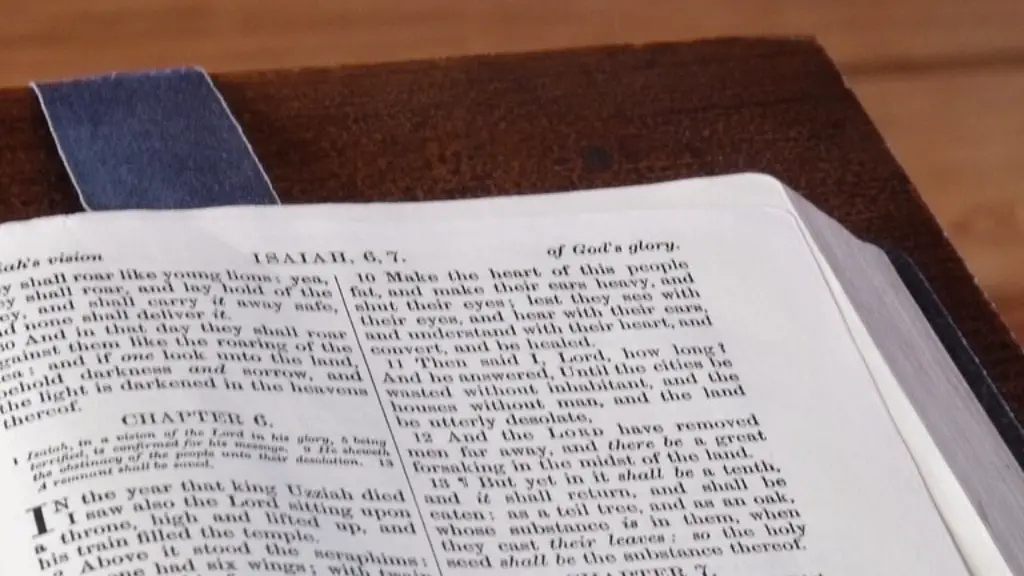How Does The Bible Describe God
The Bible is arguably one of the most influential documents ever written, and it provides a description of what is believed to be the one true God. In the Bible, God is seen as a perfect, all-powerful being who created the universe and all that is in it. He is righteous and impartial, unchangeable and omniscient, and therefore He is the only source and authority for all of life.
According to the Bible, God is one, meaning He is only one individual, not made up of different people. He is absolutely holy and just, always loving and full of mercy. He is the Creator and the Sustainer of all life. He is the source of all truth, grace and mercy. He is eternal, and He is infinite in power and wisdom.
God is described in the Bible as having both masculine and feminine characteristics. In the Old Testament, God is often portrayed as a fatherly figure, while in the New Testament He is described as a motherly figure. The Bible also states that God is incomprehensible, meaning that He is beyond human understanding and knowledge. He is also holy and righteous, meaning He is above any sort of sin or wrongdoing.
God is not only described as perfect, but He is also described as loving and forgiving. In the Bible, He is described as being ever-present and always willing to forgive those who repent. He is slow to anger and full of mercy, and He never abandons His children. This is seen throughout biblical passages, from the story of David and Bathsheba to the parable of the Prodigal Son.
God’s love for humanity is also described in the Bible. He offers salvation to any person who believes in Him, no matter their background or history. He made it known in the books of both the Old and New Testaments that He is a God who desires to be in relationship with humanity and for them to come to Him in prayer. He also invites us to know Him, love Him and follow Him.
The Bible presents God as the ultimate authority, but also as a personal God who desires to be in relationship with us. He calls us to seek Him and to love Him, and to have faith in Him. He is a living, active God who works constantly in our lives, and He desires to have intimate relationships with us. He cares and is attentive to our needs.
God’s Characteristics
God is one, according to the Bible, and He is both merciful and just. He is holy, perfect, andrighteous. He is eternal, infinite and incomprehensible. He is in a relationship of love with humanity and is the source of all truth, grace and mercy. He calls us to come to Him in prayer and invites us to get to know Him and love Him.
God’s justice and holiness are emphasized in the Bible. He is just and punishes sinners for their wrongdoings. He is also merciful and loves humanity, offering forgiveness to those who repent and seek Him. He is also forgiving and slow to anger, never abandoning His children or leaving them forgotten or alone.
God is also described as being an all powerful, omnipotent force. He is the almighty creator of the universe, and He is present in every event in history. He is sovereign and just and is not limited by the laws of physics or what humans can comprehend. He is all-knowing, omniscient, and is ever-present in our lives.
God’s love for humanity is a major theme in the Bible. He loves us unconditionally, and He desires to have a relationship with us. He is an active God who is constantly at work in our lives and He invites us to seek Him and come closer to Him. He cares for us and is attentive to our needs, even in times of trouble or distress.
God’s Actions
The Bible describes several of the actions that God has taken throughout history. These include the creation of the universe, his interventions to save his people, his guidance and comfort in times of distress, and his judgement of sin. God is known to have intervened in the lives of his people, and the Bible tells stories of his saving power and mercy, such as when he helped Moses lead the Israelites out of Egypt.
God is also known to be a source of guidance and comfort. In times of distress, his presence is there to sustain us and give us hope. He is patient and loving, and he desires for us to turn to him in our times of need. This is seen in the stories of the prophets and in passages such as the Sermon on the Mount.
God is also known for his judgement of sin. The Bible tells stories of those who disobeyed him and faced his wrath and punishment. He is a just God and he will not tolerate injustice, inequality or wickedness. He will bring punishment against those who disobey him and reject his ways, while offering forgiveness and mercy to those who repent and seek his help.
God’s judgement and mercy are both seen throughout the Bible, and they reveal his perfect character. He is a loving and just God who desires to have a relationship with humanity, and he is ever-present and ready to help in our times of need.
God’s Promises
The Bible is full of promises that God has made and will continue to make to His people. These promises are seen throughout the Old and New Testaments, and they reveal His commitment and His faithfulness. God has promised to provide for His people and to be with them wherever they go. He has promised blessings and to never abandon them. He has also promised to forgive their sins and to grant them eternal life.
The promises found in the Bible were often made to the Israelites, but they are applicable to all of us today. God has promised that He will never leave us nor forget us. He is faithful and will always be with us. He has also promised to forgive us, to provide for us and to give us joy and peace. These are promises that are still relevant today, and they remind us of God’s faithfulness and love.
The promises that God has made are enduring and still relevant today, even thousands of years after they were first made. They reveal God’s commitment to His people, and they serve as a reminder of His faithfulness and love. These promises are a source of hope and comfort, and they offer us assurance that God will never forget us or leave us.
God’s Image And Representation
The Bible speaks about God’s image, and how He is often represented in art and imagery. Throughout the Old and New Testaments, God is portrayed in a variety of forms and symbols that help us to better understand who He is and His character. This includes imagery of a lion, a shepherd and a king, all of which evoke the idea of power, strength and protection.
In the New Testament, God’s image is often represented as a loving father. This is seen in the parable of the Prodigal Son and other stories of grace, mercy and love. God is also often referred to as Shekinah, which literally means “the glory of God”. This is a reminder that His presence is always with us and that we are never alone.
God is often also portrayed as a peacemaker, light and salvation. These images help us to understand His nature and His power. He is a source of light, shining in the darkness, and He is a deliverer, providing salvation and refuge. God is the ultimate authority, and He is a loving and forgiving Father.
Finally, God is represented in the Bible as a God of love, mercy and peace. He desires to have a relationship with humanity and calls us to seek Him. He is slow to anger, full of mercy, and He never leaves us forgotten or alone. He is an eternal God, and He is infinite in power, wisdom and love.





